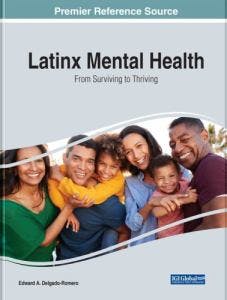Adults in the Latinx community often don’t receive treatment for severe mental illnesses.
Despite sharing similar mental health vulnerabilities as the general population, Latinx communities face a range of health disparities, including language barriers, lack of health insurance coverage, lack of cultural competence from healthcare practitioners and more.

To address these issues, a new book by Edward Delgado-Romero, associate dean for faculty and staff services in the UGA Mary Frances Early College of Education, aims to inspire a new generation of mental health researchers and practitioners to engage with Latinx communities in culturally and linguistically appropriate ways.
“This book was created to honor the collective work of many people and to identify the directions that mental health professionals need to pursue to provide truly culturally competent services to the Latinx community,” said Delgado-Romero. “It is a testament to the work and evolving expertise of several generations of UGA students who were willing to focus their research, clinical work and outreach to serve the Latinx community.”
“Latinx Mental Health: From Surviving to Thriving” is a culmination of 17 years of work by Delgado-Romero, as well as 30 authors affiliated with UGA, including professors from the School of Law and the School of Social Work, and more than 20 graduate students and alumni of the College’s counseling psychology and clinical psychology programs.
The collaborative book shares a few key tenets, including:
- Latinx people deserve to be viewed from a strength and resilience perspective rather than from a deficit model.
- Latinx people deserve to be seen (and heard) in their relevant context historically and contemporaneously.
- Given a history of exclusion and misrepresentation, Latinx people deserve to critically question social science research.
- It is imperative for social scientists to give their research, practice, teaching and outreach away for the good of the community.
All proceeds from the book were donated to U-Lead Athens, an organization focused on raising awareness and facilitating opportunities for immigrant students and students from immigrant families to access higher education.
“We chose U-Lead because we value their mission and have worked with them in the past on many projects,” said Delgado-Romero. “U-Lead represents the hope for the future, which we wrote about in our book.”
Associate editors of the book include UGA alumni Cristalís Capielo Rosario (Ph.D. ’16), Brooke Rappaport (Ph.D. ’19), Eckart Werther (Ph.D. ’12), Ruben Atilano (Ph.D. ’21) and Jhokania De Los Santos (Ph.D. ’20).
“This book’s process was unique and powerful,” said Sena. “Specifically, what made it so special were our contributing authors, our process of editing and our book tenets. We were given the opportunity to first-author chapters and had autonomy on how to discuss specific topics. Most of us are Latinx-identifying, so to talk about ourselves and bring in our unique narratives and perspectives was liberating.”